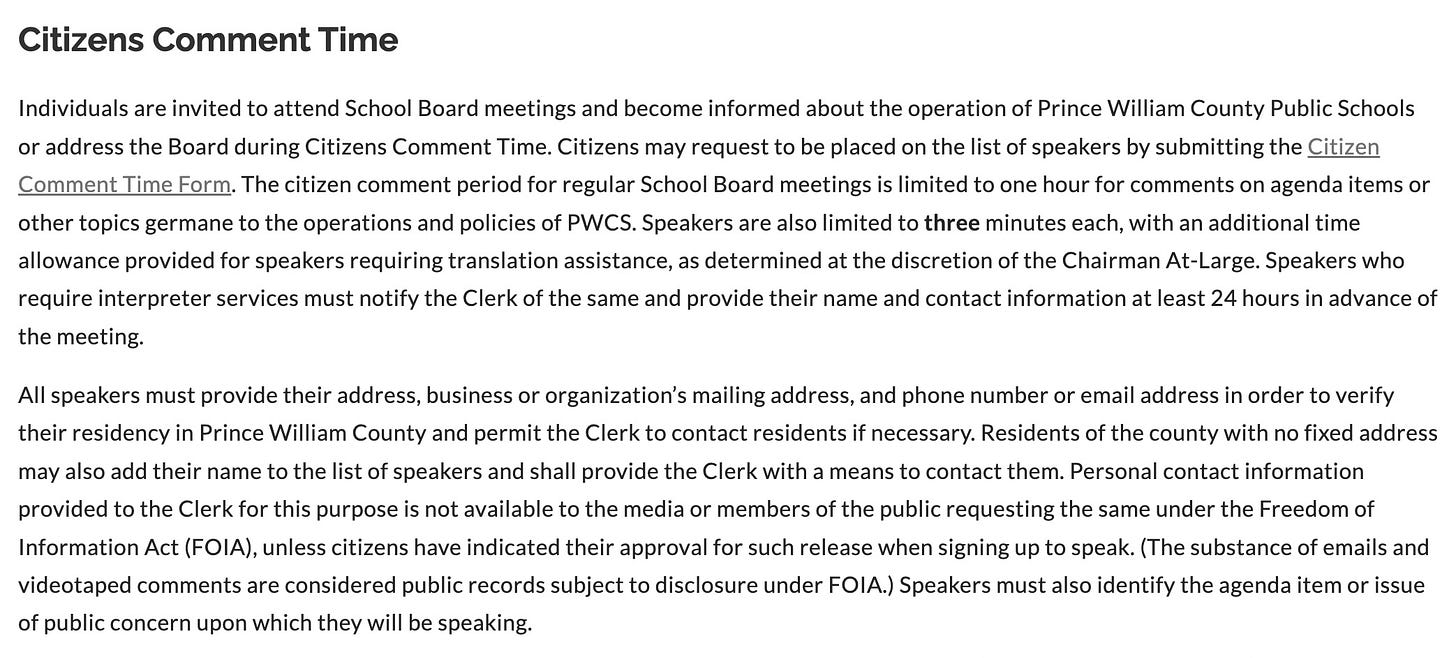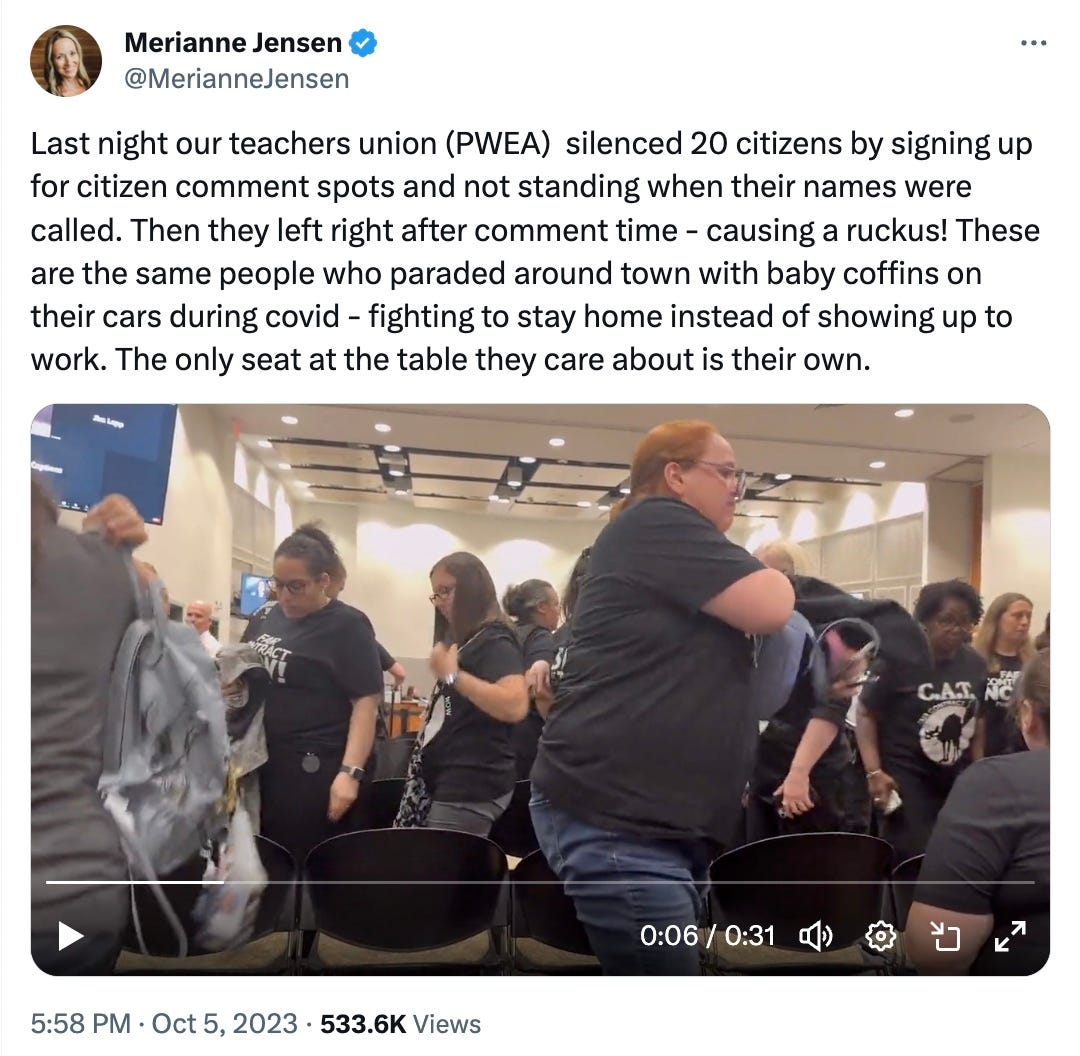Throttled: Adversarial Logic Silences the Public
and you can watch the stages as it happens
Wildly popular public sentiment is disorder, and has to be restrained. So here, let’s start with something vital and interesting, and then work our way through the process a local government is using to kill it. As always, the point about this local story isn’t just the local story, since versions of this are happening all over the country (and with federal assistance).
Early last year, an angry Virginia mom spoke to the Prince William County school board, blasting mask mandates in schools. Her fiery three-minute speech went viral, until YouTube, which now seems to mostly exist to prevent discussion, killed it:
It’s back, in a less-watched version that YouTube hasn’t gotten around to cancelling yet:
Here’s a version on Rumble, if you’d rather watch it there, but Substack doesn’t embed Rumble video.
The second thing to notice in that video, after you notice the clarity and strength of Merianne Jensen’s comments, is the response: an enormous audience of parents shouting and cheering in support as another parent sharply criticizes school district policy. The public is present for a government meeting, and the public is engaged. Citizens are participating, enthusiastically and in large numbers, which is supposed to be a thing we regard as an ideal.
So, predictably, the Prince William County school board began working to solve that problem. Here are the current requirements, implemented near the beginning of this year, for parents who wish to speak to the school board at its meetings:
Public comment is limited to one hour, full stop, no matter how many people wish to speak, and no matter how urgent a controversy before the board might be. The public — the entire public — gets an hour. But, second, that hour is alloted through an application process in which people who wish to speak to the school board fill out an online form that a clerk then evaluates and processes, deciding whether or not a request to speak will be granted. Detailed contact information is required before the school district will consider your request to speak, and national organizations and other outsiders have no right to speak at all, since public comment is limited to verified residents of the county. The form is a masterpiece of passive-aggressive nudging, communicating with great clarity that your desire to offer public comment is merely being tolerated. Read this carefully, because in a few minutes we’re going to get to the pernicious way this system is now being gamed:
This form does NOT confirm your request to be added to the list of speakers for Citizen Comment Time. You will receive a separate email indicating the status of your request. As a reminder, speakers are signed up to speak on a first-come, first-served basis.
Thank you again for your interest.
Citizens may sign up to be placed on the list of speakers for the citizen comment period starting at 8:00 a.m. on the Saturday immediately preceding the School Board meeting at which the citizen wishes to speak. Requests received prior to 8:00 a.m. on the Saturday immediately preceding the School Board meeting will not be honored. Speakers will be signed up on a first-come, first-served basis, ending at noon on the day of the meeting. The sign-up list will close once the number of total speakers who have signed up reaches twenty and there will be no sign-up thereafter, nor at the meeting.
That last sentence will become important: twenty commenters are signed up in advance, in the order in which they apply, and then the list for public comment is closed, the end. Can you see where this is going?
Before we get there, I’ll just note that a more detailed board policy on comments, available here, adds that the board chairman can end a public comment session, and ask school district security to remove speakers, if a commenter wanders into “inappropriate topics” or a tone the board regards as uncivil. You can feel the spontaneity and openness being drained.
And so then we get to the denouement, seen here, and click the link to watch the video:
Speakers sign up in advance, for a hard limit of twenty speaker slots, so the teachers union is making a coordinated effort to sign up for public comment, filling the available slots and ensuring that parents can’t. At the October 4 school board meeting, 17 of 20 “speakers” were from the Prince William Education Association (PWEA), and — pay close attention to this part! — most didn’t speak. They took the limited number of speaker cards to take them, not to say something. You can watch this happen here, starting around 31:08:
Note that the first speaker, at 32:05, is wearing a union t-shirt, and he explicitly announces that most of the union members who have signed up to speak won’t be speaking. He identifies it as a strategy, right out loud: they took speaker cards with the intention of not speaking, as a way of protesting a round of collective bargaining that isn’t delivering their demands.
So in less than two years, we’ve gone from a room full of deeply engaged parents to a climate of enforced silence, as public comment is sharply limited and parents are prevented from speaking. The board, having heard that the PWEA deliberately took most of the limited number of speaker cards, just closed the public comment session and went on with the rest of their meeting. Seeing that the system they created to limit public comment had been manipulated to limit it further — in fact, to nearly end public comment altogether — they didn’t intervene to allow the excluded public to speak.
Two years: from vigorous public participation to nearly no public participation.
I spoke to Merianne Jensen today, and this is the part that bothered her: the school board’s refusal to acknowledge or remedy the deliberate manipulation of public comment to prevent parents from speaking. "That's where I take issue,” she said. “They just went on."
Jensen, who runs the local chapter of Moms for Liberty, has watched as parent participation has declined during school board meetings. She asks people to attend, she says, but people ask why they should bother. “They say the board doesn't care,” she says. “And it's true — they don't care."
Having now manipulated the public comment session once, the PWEA has learned that they can. Jensen is watching for the effects on future meetings, since there’s no policy in place to prevent or punish the calculated hoarding of the few available speaker slots. “They can do it next time,” she says. “There's no mechanism in place to penalize them."
But Jensen — who has been focused, lately, on the decision of the Prince William County schools to reject Governor Glenn Youngkin’s model policies on transgender students — is losing patience for the throttling of public comment, and finds herself wondering about local First Amendment lawyers. For now, though, she’s focusing on the next round of school board elections, and electing a slate of board members who are open to public sentiment. (I’ve written before about parents who successfully sued school districts over limits to public comment.)
The current school board members don’t appear to see the point. As Jensen notes, several of them closed their most recent meeting — the one with the manipulated public comment session that prevented parents from speaking — with a reminder that they welcome input from the public, and want to hear from parents.
I sent email messages to the PWEA office and the communications department of the Prince William County School District last night, asking for comment. PWEA didn’t respond, and an “executive administrative assistant” in the school district offices sent a message to let me know that my pending request for comment is being distributed to communications staff.





A "by the way" additional thought: I live in the wokest of the woke-ass deep blue zones, and when my small town school board voted to return to in-person schooling, so many parents showed up to give public comment that the meeting ran past midnight, with a huge crowd still waiting to speak. So they....
....adjourned until the next night, then came back again to a second meeting to make sure they heard from EVERY. SINGLE. PERSON. who wanted to speak. Then, and only then, did they vote.
It's possible. The fight for openness goes on.
Walk away and build your own school. These idiots are the minority, the parents and kids are not. Destroy them by excluding them from any discussion or influence. They lose.